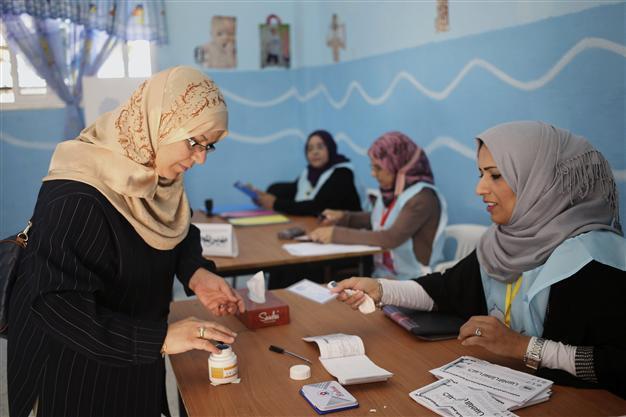No victor in Lebanon first-round presidential vote
BEIRUT - Agence France-Presse

A woman dips her finger in a bottle of ink before voting in the municipal election at a polling station in Benghazi April 19, 2014. REUTERS Photo
Lebanon's parliament failed to elect a new president on Wednesday, with no candidate securing the two-thirds of the vote needed to win and many lawmakers leaving their ballots blank.
With the parliament divided between two powerful blocs, one centred around the Hezbollah movement and the other opposed to it, the outcome had been expected.
The parliament will now hold a second vote on April 30, in which the winning candidate will only need a simple majority of 65 votes.
In Wednesday's vote, 124 of the parliament's 128 members were present, with 48 casting their ballots for Samir Geagea, the candidate backed by the March 14 movement opposed to Hezbollah.
Observers had predicted Geagea would fail to win the two-thirds majority required because of his fierce anti-Hezbollah stance.
Members of the rival March 8 bloc centred around the powerful Shiite Hezbollah movement have not officially backed a candidate, and most of its members appeared to have submitted blank ballots -- 52 in total.
A second candidate, Henri Helou, who is backed by members of a small bloc of independents and centrists, won 16 votes.
One vote was submitted for former president Amine Gemayel, and seven votes were deemed void.
Hezbollah's bloc, which holds 57 seats in the parliament, has yet to announce its support for a candidate.
But its supporters strongly oppose Geagea for his anti-Hezbollah stance, while other critics point to his convictions for crimes committed during the country's 1975-1990 civil war.
Several lawmakers marked their ballots with the names of political figures Geagea was convicted of killing during the war.
Lawmakers must pick a replacement for President Michel Sleiman before his term ends of May 25, but the political class remains deeply divided over the issue of Hezbollah's arsenal and the war in neighbouring Syria.
The March 14 bloc, led by Saad Hariri, the son of assassinated former prime minister Rafiq Hariri, wants Hezbollah's military power reined in and largely backs the uprising against Syria's President Bashar al-Assad.
Hezbollah and its supporters say it needs its weapons to protect Lebanon from Israel, and the Shiite movement has sent thousands of fighters to Syria to support President Bashar al-Assad.
